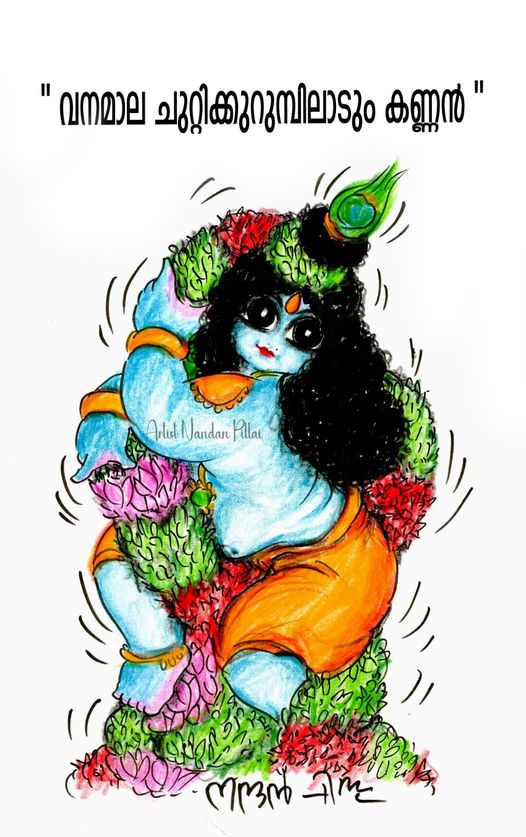Introduction:
Lord Krishna, one of the most revered deities in Hinduism, stands as a symbol of divinity, love, and wisdom. His life and teachings, encapsulated in the ancient scriptures of the Mahabharata, Bhagavad Gita, and the Puranas, continue to inspire millions across the globe. Born in the Dwapara Yuga, Krishna’s life is a tapestry of divine interventions, profound philosophy, and remarkable exploits. This essay delves into the multifaceted persona of Lord Krishna, exploring his divine attributes, life events, teachings, and enduring legacy.
Origins and Birth of Lord Krishna:
The birth of Krishna, celebrated as Janmashtami, marks the divine intervention of Vishnu, the preserver in Hindu trinity. He incarnates on Earth in response to the increasing tyranny and oppression inflicted upon humanity. Born in the Yadava clan of Mathura to Devaki and Vasudeva, Krishna’s birth was accompanied by celestial signs and miracles, indicative of his divine nature. To safeguard him from the tyrant King Kansa, Krishna was secretly transported to Gokul, where he was raised by his foster parents, Yashoda and Nanda.
Childhood Exploits and Leelas:
Krishna’s childhood, often portrayed in Hindu scriptures and folklore, is replete with divine exploits and playful antics. His interactions with the Gopis, particularly his beloved Radha, symbolize the essence of divine love and devotion. The episodes of stealing butter, playing the flute, and performing mesmerizing dances (Raas Leela) further exemplify Krishna’s divine charm and magnetism.
Krishna as a Friend, Philosopher, and Guide:
As Krishna grew older, his divine mission expanded beyond mere playful antics. He emerged as a trusted friend, philosopher, and guide to his devotees and allies. His friendship with Arjuna, a central figure in the Mahabharata, is immortalized in the Bhagavad Gita, where Krishna imparts profound wisdom and guidance amidst the battlefield of Kurukshetra. The teachings of the Bhagavad Gita, encompassing concepts of duty (dharma), righteousness, and devotion, continue to serve as a guiding light for humanity.
Divine Manifestations and Miracles:
Krishna’s life is interspersed with numerous divine manifestations and miracles, demonstrating his omnipotence and divine grace. From lifting the Govardhan hill to protect his devotees from Indra’s wrath to defeating formidable demons like Kaliya and Putana, Krishna’s exploits showcase his unparalleled strength and divine prowess. Each miracle serves as a testament to his divine identity and purpose.
Krishna’s Role in the Mahabharata:
The Mahabharata, one of the greatest epics in Hindu mythology, narrates the tale of the Kurukshetra war and the cosmic conflict between righteousness and evil. Krishna plays a pivotal role as the charioteer and advisor to Arjuna, steering the Pandavas towards victory and upholding the principles of dharma. His divine discourse in the Bhagavad Gita not only provides Arjuna with clarity and resolve but also imparts timeless wisdom to humanity.
Ras Leela: The Divine Dance of Love:
The Ras Leela, a celestial dance performed by Krishna and the Gopis, symbolizes the epitome of divine love and devotion. It transcends the mundane realm, depicting the eternal union between the individual soul (jiva) and the Supreme Soul (Paramatma). The Ras Leela serves as a metaphor for the spiritual journey, wherein devotees strive to attain union with the divine through unwavering love and devotion.
Philosophical Teachings of Lord Krishna:
Krishna’s teachings encompass a vast spectrum of philosophical concepts, ranging from the nature of reality to the path of liberation (moksha). Central to his teachings is the concept of ‘Karma Yoga,’ emphasizing the performance of selfless actions without attachment to the results. He elucidates the principles of ‘Bhakti Yoga,’ advocating devotion and surrender to the divine as the path to spiritual realization. Additionally, Krishna expounds upon the concept of ‘Jnana Yoga,’ the path of knowledge, wherein one transcends the illusions of the material world through discernment and wisdom.
Legacy and Worship:
The legacy of Lord Krishna transcends geographical boundaries and cultural barriers, permeating the hearts and minds of millions worldwide. His divine leelas, teachings, and miracles continue to inspire devotion and reverence among devotees. Janmashtami, the celebration of Krishna’s birth, is marked with fervent devotion, elaborate rituals, and joyous festivities across the globe. Temples dedicated to Krishna, such as the iconic ISKCON temples, serve as centers of worship and spiritual enlightenment, attracting devotees from all walks of life.
Conclusion:
In conclusion, Lord Krishna remains an eternal beacon of love, wisdom, and divinity in Hindu mythology. His life and teachings exemplify the timeless principles of righteousness, devotion, and spiritual realization. From his divine birth in Mathura to his celestial discourse in the Bhagavad Gita, Krishna’s legacy continues to resonate with humanity, guiding souls towards the path of liberation and divine bliss. As the embodiment of love and compassion, Lord Krishna’s eternal presence continues to illuminate the hearts of devotees, inspiring them to tread the path of righteousness and self-realization.


